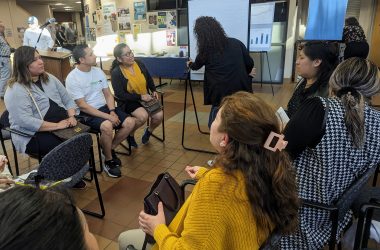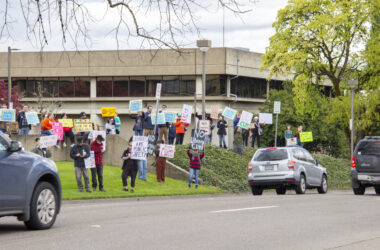 Tents line the boulevard next to The ARCHES Project in downtown, where homeless residents have congregated in recent weeks. (Troy Brynelson/Salem Reporter)
Tents line the boulevard next to The ARCHES Project in downtown, where homeless residents have congregated in recent weeks. (Troy Brynelson/Salem Reporter)
Salem City Council approved a new city law Monday night that will regulate certain behaviors on sidewalks, but it won’t include perhaps its most controversial piece.
The law — known informally as ‘sit-lie’ — will prevent people from setting up camp on sidewalks and other public property. It will also restrict how long they can leave personal property unattended.
But councilors agreed to remove the piece of the law that would have banned sitting or lying on public spaces from 7 a.m. to 9 p.m. Councilor Chris Hoy moved for its removal.
“The sit-lie portion of this law… has the appearance of the least amount of compassion,” Hoy said.
Councilor Cara Kaser seconded. She said the disruptive behaviors that fueled support for the ordinance, like property damage to downtown businesses and human waste, wouldn’t be helped by banning sitting or lying.
“It doesn’t really address concerns of downtown business owners,” she said. “Someone can still sleep downtown and you’d encounter that behavior we’ve heard about, then they leave in the morning.”
Councilors also agreed to remove the piece that violating the new city laws could ban a person from an area. Salem has two crime prevention districts a person can be banned from: downtown and north Salem.
Councilors voted 8-1 to pass the new law. Councilor Jim Lewis was the lone no.
The new law doesn’t go into effect, however, until the council votes on it again in December, a standard procedure.
The decision followed more than an hour of public testimony, punctuated by comments by top city staff.
City Manager Steve Powers and Salem Police Department Chief Jerry Moore each took an opportunity to say sit-lie wouldn’t criminalize homelessness, as some fear. Both said complaints of disruptive behavior have gotten louder and more numerous recently.
“What we’ve found is for the last three, four, five years… we’ve received numerous, ongoing, weekly complaints about behavior and conduct,” Moore said.
No data has been produced by the city to demonstrate those behaviors have gotten worse. Several city business owners say it has.
Emotional testimonies
Testimony tilted heavily against the ordinance and sometimes became emotional.
Stanley Thornhill, a homeless resident, said a lot of people don’t realize how embarrassing it is to be sleeping on streets at night. He said people look at him and other homeless residents like they’re “worthless.”
“It really bothers and hurts me to see a group of people want to put together something as senseless as this act, to drive homeless people basically underground,” he said.
Lorrie Walker, a volunteer with homeless services providers and a retired worker with the Oregon State Hospital, said local governments should spend their energy pushing for systemic changes for mentally ill people.
“We as a city and a county are not holding the state accountable for what’s happening with our broken mental health system,” she said. “And then we’re proposing an ordinance that would target these folks who don’t know, don’t understand they can be excluded somewhere or expelled from downtown, because they already lost you after three to five words.”
Jeffrey Miller, a recovering addict, called the proposed law misguided.
“In spite of your intentions, sit and lie is wrong because it hurts the people that need it most: the physically and mentally disabled,” he said.
In all, 45 people signed up to speak at sit-lie. A handful of people spoke in support, such as T.J. Sullivan, board president of the Salem Area Chamber of Commerce, and Tom Hoffert, the organization’s CEO.
Hazel Patton, a board member of the Salem Main Street Association, said the ordinance is needed to defend downtown businesses from aggressive behaviors by some homeless residents. They said those residents damage property and scare customers.
“Downtown is the heart of our community,” she said. “If you have someone who comes and visits you, don’t you take them downtown?”
Mark Hanke, a pastor at Salem First Baptist Church, said homelessness is a complex problem, but he welcomed the law to break-up camps in Salem that have become “unsafe,” he said.
“Allowing what we’re allowing is dangerous for those who are downtown. They need a place. But what we’re allowing is dangerous and it’s wrong,” Hanke said.
‘All roads lead to Rome’
Before and during Monday’s meeting, the legality of Salem’s proposal loomed.
Sidewalk restrictions have run into legal trouble often. The city of Portland tried to enact its own sit-lie law in 2009 that was ultimately deemed unconstitutional. And, in 2018, the 9th Circuit Court of Appeals ruled the city of Boise couldn’t ban sleeping on sidewalks without criminalizing homelessness.
Disability Rights Oregon, a nonprofit law firm that represents the interests of people with disabilities across the state, condemned it in a five-page letter, saying it created a dozen problems.
“The city of Salem should no longer pursue the proposed ordinance because it disproportionately impacts unsheltered mentally ill individuals, criminalizes the mentally ill, creates barriers to successful transition off the streets, feeds the stigma of mental illness, threatens the health, safety, and survival of vulnerable persons with disabilities, and poses an undue administrative and financial burden,” wrote Managing Attorney Matthew Serres.
Serres also refuted the argument that because the sit-lie law started off with warnings that it wouldn’t create more arrests. A person banned from a crime prevention district would have been served an “exclusion notice.” If that person re-enters, they could be arrested for trespassing.
“All roads lead to Rome — exclusion orders just one more step in the inevitable process of arrest and incarceration,” he wrote.
Councilor Vanessa Nordyke noted Monday evening that she didn’t want to see the city end up in court defending the law.
“I know litigation is costly and I question whether it’s a good use of our resources,” she said.
Have a tip? Contact reporter Troy Brynelson at 503-575-9930, [email protected] or @TroyWB.
 Donald Ray Martin, of Salem, stands in front his tent and camp stove near The ARCHES Project on Wednesday. His tent qualifies as a structure that would be impacted by the city of Salem’s new ordinance. (Troy Brynelson/Salem Reporter)
Donald Ray Martin, of Salem, stands in front his tent and camp stove near The ARCHES Project on Wednesday. His tent qualifies as a structure that would be impacted by the city of Salem’s new ordinance. (Troy Brynelson/Salem Reporter)









